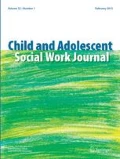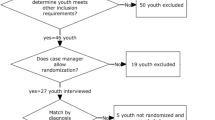Abstract
Youth who exit foster care often have mental health treatment histories, but they commonly discontinue treatment after exiting the system. The purpose of this study was to adapt an intervention designed to improve engagement/investment in mental health treatment, specifically to be delivered to youth aging out of foster care. An iterative process that incorporated focus groups with both youth and providers was used to adapt the original intervention curriculum, then the feasibility of implementation of the adapted intervention in settings for older foster youth was explored. Language of the intervention manuals was modified so terms resonated more with youth and was simplified to be accessible to low reading levels. Two new sessions were added to provide skills for talking with providers and to assist in incorporating mental health into broader transition goals for foster youth. The adapted intervention was implemented on an ongoing basis at a transition drop-in center. The adapted intervention was found to be acceptable by facilitators and youth participants. The most feasible and acceptable content and setting for the group to be implemented in an ongoing way emerged from the results. Future efficacy studies are needed to determine whether outcomes such as attitudes toward mental health services and engagement are changed by the intervention. Preliminary testing supports the potential for integrating the adapted engagement intervention into broader transition planning efforts since mental health has strong connections with other transition domains.
Similar content being viewed by others
References
Aarons, G. A., Sklar, M., Mustanski, B., Benbow, N., & Brown, C. H. (2017). “Scaling-out” evidence-based interventions to new populations or new health care delivery systems. Implementation Science, 12(111), 1–13. https://doi.org/10.1186/s13012-017-0640-6.
Ben-David, S., Cole, A., Spencer, R., Jaccard, J., & Munson, M. R. (2017). Social context in mental health service use among young adults. Journal of Social Service Research, 43(1), 85–99. https://doi.org/10.1080/01488376.2016.1239595.
Berkel, C., Mauricio, A. M., Schoenfelder, E., & Sandler, I. N. (2011). Putting the pieces together: An integrated model of program implementation. Prevention Science, 12(1), 23–33.
Braun, V., & Clarke, V. (2013). Successful qualitative research: A practical guide for beginners (pp. 174–180). Los Angeles: Sage.
Courtney, M. E., Dworsky, A., Brown, A., Cary, C., Love, K., & Vorhies, V. (2011). Midwest study of the adult functioning of former foster youth: Outcomes at age 26. Chicago, IL: Chapin Hall.
Courtney, M. E., Dworsky, A., Ruth, G., Havlicek, J., Perez, A., & Keller, T. (2007). Midwest evaluation of the adult functioning of former foster youth: Outcomes at age 21. Chicago, IL: Chapin Hall Center for Children.
dos Reis, S., Zito, J. M., Safer, D. J., & Soeken, K. L. (2001). Mental health services for youths in foster care and disabled youths. American Journal of Public Health, 91(7), 1094–1099.
Fergusson, D. M., Horwood, L. J., Ridder, E. M., & Beautrais, A. L. (2005). Subthreshold depression in adolescence and mental health outcomes in adulthood. Archives of General Psychiatry, 62(1), 66–72.
Ferrer-Wreder, L., Sundell, K., & Mansoory, S. (2012). Tinkering with perfection: Theory development in the intervention cultural adaptation field. Child and Youth Care Forum, 41, 149–171.
Friesen, B. J. (2007). Recovery and resilience in children's mental health: Views from the field. Psychiatric Rehabilitation Journal, 31(1), 38.
Havlicek, J. R., Garcia, A. R., & Smith, D. C. (2013). Mental health and substance use disorders among foster youth transitioning to adulthood: Past research and future directions. Children and Youth Services Review, 35(1), 194–203.
Jorm, A. F. (2000). Mental health literacy: Public knowledge and beliefs about mental disorders. The British Journal of Psychiatry, 177, 396–401.
Keller, T. E., Salazar, A. M., & Courtney, M. E. (2010). Prevalence and timing of diagnosable mental health, alcohol, and substance use problems among older adolescents in the child welfare system. Children and youth services review, 32(4), 626–634.
Lee, B., Munson, M., Ware, N., Ollie, M., Scott, L., & Mcmillen, J. (2006). Experiences of and attitudes toward mental health services among older youths in foster care. Psychiatric Services, 57(4), 487–492. https://doi.org/10.1176/ps.2006.57.4.487.
Lee, T., Festinger, T., Jaccard, J., & Munson, M. (2017). Mental health subgroups among vulnerable emerging adults, and their functioning. Journal of the Society for Social Work and Research, 8(2), 161–188. https://doi.org/10.1086/692019.
Mackie, T. I., Cook, S., Crystal, S., Olfson, M., & Akincigil, A. (2020). Antipsychotic use among youth in foster care enrolled in a specialized managed care organization intervention. Journal of the American Academy of Child & Adolescent Psychiatry, 59(1), 166–176.
Marsiglia, F. F., & Booth, J. M. (2015). Cultural adaptation of interventions in real practice settings. Research on Social Work Practice, 25(4), 423–432. https://doi.org/10.1177/1049731514535989.
McMillen, J. C., Fedoravicius, N., Rowe, J., Zima, B. T., & Ware, N. C. (2007). A crisis of credibility: Professionals’ concerns about the psychiatric care provided to clients of the child welfare system. Administration and Policy in Mental Health and Mental Health Services Research, 34, 203–212.
McMillen, J. C., & Raghavan, R. (2009). Pediatric to adult mental health service use of young people leaving the foster care system. Journal of Adolescent Health, 44(1), 7–13.
McMillen, J. C., Scott, L. D., Zima, B. T., Ollie, M. T., Munson, M. R., & Spitznagel, E. (2004). Use of mental health services among older youths in foster care. Psychiatric Services, 55(7), 811–817.
McMillen, J. C., Zima, B. T., Scott, L. D., Auslander, W. F., Munson, M. R., Ollie, M. T., et al. (2005). Prevalence of psychiatric disorders among older youths in the foster care system. Journal of the American Academy of Child & Adolescent Psychiatry, 44(1), 88–95.
Munson, M. R., Cole, A., Jaccard, J., Kranke, D., Farkas, K., & Frese, F. J. (2016). An engagement intervention for young adults with serious mental health conditions. The Journal of Behavioral Health Services & Research, 43(4), 542–563.
Munson, M. R., & Jaccard, J. (2018). Mental health service use: A communication framework for program development. Administration and Policy in Mental Health and Mental Health Services Research, 45(1), 62–80.
Munson, M. R., Jaccard, J., Scott, L. D., Jr., Moore, K., Narendorf, S., Cooper, K., Shimizu, R., Pleines, K., Rodwin, A., Amaro, A., & Hylek, L. (2020). Engagement in mental health services among young adults with serious mental illnesses. Paper presented at the Society for Social Work and Research Conference, Washington, DC.
Munson, M. R., Jaccard, J., Smalling, S. E., Kim, H., Werner, J. J., & Scott, L. D. (2012). Static, dynamic, integrated, and contextualized: A framework for understanding mental health service utilization among young adults. Social Science & Medicine, 75, 1441–1449. https://doi.org/10.1016/j.socscimed.2012.05.039.
Munson, M. R., Katz, C. C., Okpych, N., & Courtney, M. E. (in press). Mental health management among older youth in foster care: Service utilization and preparedness. Journal of Adolescent Health.
Munson, M. R., & McMillen, J. C. (2010). Trajectories of depression symptoms among older youths exiting foster care. Social Work Research, 43(4), 235–249.
Munson, M. R., Scott, L. D., Jr., Smalling, S. E., Kim, H., & Floersch, J. E. (2011). Former system youth with mental health needs: Routes to adult mental health care, insights, emotions, and mistrust. Children and Youth Services Review, 33, 2261–2266.
Narendorf, S. C., Bertram, J., & McMillen, J. C. (2011). Diagnosis and medication overload? A nurse review of the psychiatric histories of older youth in treatment foster care. Child Welfare, 90(3), 27–43.
Narendorf, S. C., Munson, M. R., Ben-David, S., Cole, A., & Scott, L. (2018). Race and gender differences in attitudes toward help seeking among marginalized young adults with mood disorders: A mixed methods investigation. Psychiatric Rehabilitation Journal, 41(4), 277.
Olino, T. M., Klein, D. N., Lewinsohn, P. M., Rohde, P., & Seeley, J. R. (2010). Latent trajectory classes of depressive and anxiety disorders from adolescence to adulthood: Descriptions of classes and associations with risk factors. Comprehensive Psychiatry, 51(3), 224–235.
Osgood, D. W., Foster, E. M., & Courtney, M. E. (2010). Vulnerable populations and the transition to adulthood. Focus on Children, 20(1), 209–229.
Radloff, L. S. (1977). The CES-D scale: A self-report depression scale for research in the general population. Applied Psychological Measures, 1, 385–401. https://doi.org/10.1177/014662167700100306.
Raghavan, R., Munson, M. R., & Le, C. (2019). Toward an Experimental Therapeutics Approach in Human Services Research. Psychiatric Services, 70, 1130–1137.
Rayner, S., Thielking, M., & Lough, R. (2018). A new paradigm of youth recovery: Implications for youth mental health service provision. Australian Journal of Psychology, 70(4), 330–340.
Resnicow, K., Soler, R., Braithwaite, R. L., Ahluwalia, J. S., & Butler, J. (2000). Cultural sensitivity in substance use prevention. Journal of Community Psychology, 28(3), 271–290.
Sakai, C., Mackie, T. I., Shetgiri, R., Franzen, S., Partap, A., Flores, G., et al. (2014). Mental health beliefs and barriers to accessing mental health services in youth gaining out of foster care. Children at Risk, 14(6), 565–573.
Samuels, G. M., & Pryce, J. M. (2008). “What doesn’t kill you makes you stronger”: Survivalist self-reliance as resilience and risk among young adults aging out of foster care. Children and Youth Services Review, 30(10), 1198–1210.
Shin, S. H. (2005). Need for and actual use of mental health service by adolescents in the child welfare system. Children and Youth Services Review, 27(10), 1071–1083.
Simmons-Horton, S. (2017). Providing age-appropriate activities for youth in foster care: Policy implementation process in three states. Children and Youth Services Review, 82, 383–439. https://doi.org/10.1016/j.childyouth.2017.10.007.
Villagrana, M., Guillen, C., Macedo, M., & Lee, S. (2018). Perceived self-stigma in the utilization of mental health services in foster care and post foster care among foster care alumni. Children and Youth Services Review, 85, 26–34.
Wingood, G. M., & DiClemente, R. J. (2008). The ADAPT-ITT model: A novel method of adapting evidence-based HIV Interventions. Journal of Acquired Immune Deficiency Syndrome, 47(1), 40–46.
Zito, J. M., Safer, D. J., Sai, D., Gardner, J. D., Thomans, D., Coombes, P., et al. (2008). Psychotropic medication patterns among youth in foster care. Pediatrics, 121(1), 157–163.
Acknowledgements
This work was funded by a Recovery Research Grant from the Hogg Foundation for Mental Health (RRG-027). Special thanks to our agency partners.
Author information
Authors and Affiliations
Corresponding author
Ethics declarations
Conflicts of interest
The authors declare that they have no conflict of interest.
Additional information
Publisher's Note
Springer Nature remains neutral with regard to jurisdictional claims in published maps and institutional affiliations.
Rights and permissions
About this article
Cite this article
Narendorf, S.C., Glaude, M., Munson, M.R. et al. Adaptation of a Mental Health Treatment Engagement Intervention for Older Foster Youth. Child Adolesc Soc Work J 38, 27–41 (2021). https://doi.org/10.1007/s10560-020-00664-6
Published:
Issue Date:
DOI: https://doi.org/10.1007/s10560-020-00664-6



